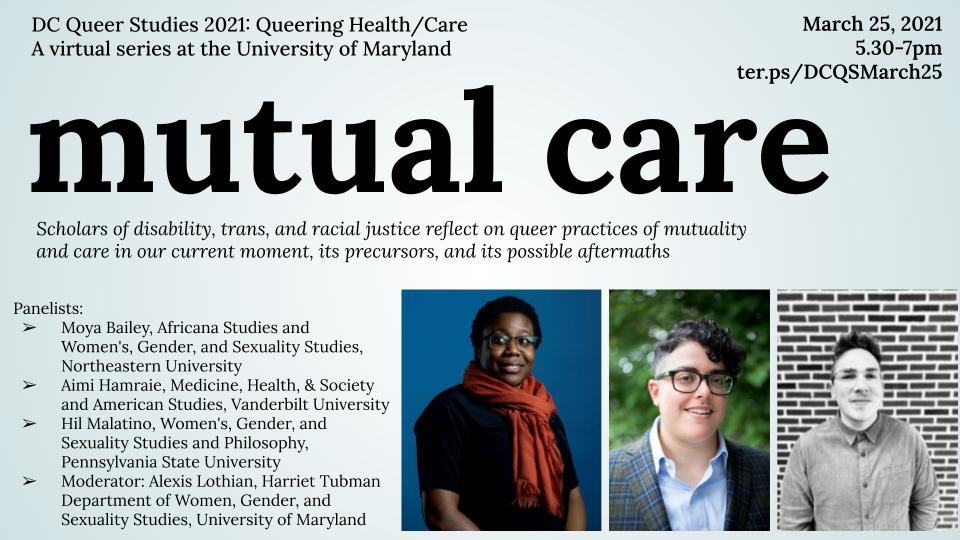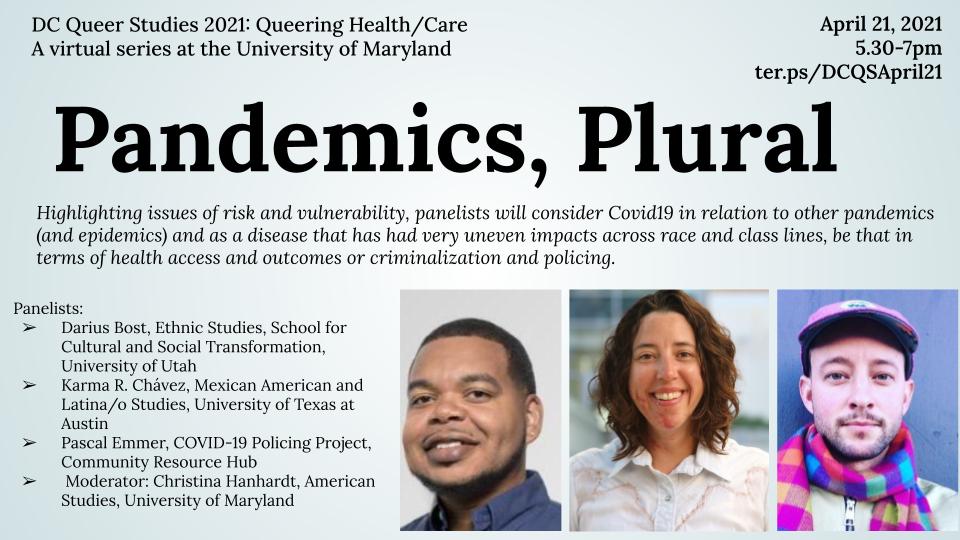D.C. Queer Studies 2021: Queering Health/Care
Bringing together scholars in queer and trans studies and related fields to think through the politics of the body and health at this moment.
Presenting Mutual Care; Pandemics, Plural; and Queering Health/Care: A DC-area Symposium
During spring semester of 2021, the LGBTQ Studies Program of the Harriet Tubman Department of Women, Gender, and Sexuality Studies is sponsoring a series of events dedicated to the queer politics of health and care. From its earliest days, queer theory has been invested in the politics of health, its emergence coinciding with the urgent demands of responding to the AIDS crisis. Academic queer studies was powerfully influenced by social movements’ acts of radical protest and collective care in the face of the stigmatization and abandonment of people with HIV/AIDS. And throughout the field’s many turns, a concern with the politics of the body has remained central, especially as queer scholarship intersects and overlaps with disability studies, critical race theory, and trans studies. Now, the impact of COVID19 is once again revealing the ways in which certain populations bear the brunt of unequal access to healthcare and essential social services, and non-state-based formations of care and support are once again emerging as a matter of urgent necessity. This series brings together scholars in queer and trans studies and related fields to think through the politics of the body and health at this moment.
ASL interpreting and live captioning will be provided for each event. Please contact dcqs@umd.edu for any other accessibility requests
Past events

Scholars working at the intersections of disability, trans, and racial justice gather to reflect on queer practices of mutuality and care in our current moment, its precursors, and its potential aftermaths.
“We are all in this together,” institutions and corporations insist as they communicate their ever-changing pandemic response mandates. Those who bear the brunt of COVID-19’s medical, social, and economic impacts know that this is not and never has been the case. Yet coming together to create collectives outside of formal institutional contexts has long been a survival strategy for racialized, queer, trans, and disabled people whose needs, vulnerabilities, and capacities to offer care have been excluded from white supremacist, heteronormative, cisnormative, and ableist structures. From digital camaraderie in the face of health discrimination to collectivizing personal care to shared planning for surviving state abandonment, multiply marginalized people have needed and created myriad networks for support, pedagogy, and world-building. What lessons do past and ongoing practices of mutual care hold for life in the pandemic and its potential aftermaths? What relationship do they bear to academic and other state institutions? How are mutual care networks and practices precarious, how can they best be supported, and what futures might they hold?
- Moya Bailey, Africana Studies and Women's, Gender, and Sexuality Studies, Northeastern University
- Aimi Hamraie, Medicine, Health, & Society and American Studies, Vanderbilt University
- Hil Malatino, Women's, Gender, and Sexuality Studies and Philosophy, Penn State University
- Moderator: Alexis Lothian, Harriet Tubman Department of Women, Gender, and Sexuality Studies, University of Maryland
April 21, 5:30pm - Pandemics, Plural

In 2020, the global circulation of a new virus and of images of anti-black police violence in the U.S. led many to describe Covid19 and U.S. racism as “twin” or “dual” pandemics. A formulation intended to highlight the links between entrenched and widespread structures of inequality, this pairing has also at times obscured the long-standing and historically specific ways in which white supremacy, racism, and anti-blackness operate through regimes of health and state violence in the U.S. and around the world. Similarly, efforts to compare Covid19 with other pandemics, such as AIDS, reveal that the politics of comparison can obscure some things as they make others clear. This panel brings together scholars to think about pandemic in the plural: both putting Covid19 in relation to other pandemics (and epidemics) historically and today, and as a different disease for different populations, be it in health access and outcomes, or the experience of criminalization and policing. How are our understandings of pandemics shaped by questions of scale, crisis, and continuity? What does the term 'pandemic' open up and limit? How have social movements responded to state power and resource distribution? What are the connections between the politics of health, police power, and other forms of state violence? Ultimately, the panel hopes to consider how we might put into more direct conversation Ruth Wilson Gilmore’s definition of racism as “the state sanctioned or extra-legal production and exploitation of group-differentiated vulnerabilities to premature death” with Cathy Cohen’s reminder that “many of the roots of heteronormativity are in white supremacist ideologies which sought (and continue) to use the state and its regulation of sexuality . . . to designate which individuals were truly "fit" for full rights and privileges of citizenship.”
Highlighting issues of risk and vulnerability, panelists will consider Covid19 in relation to other pandemics (and epidemics) and as a disease that has had very uneven impacts across race and class lines, be that in terms of health access and outcomes or criminalization and policing.
- Darius Bost, Ethnic Studies, School for Cultural and Social Transformation, University of Utah
- Karma R. Chávez, Mexican American and Latina/o Studies, University of Texas at Austin
- Pascal Emmer, COVID-19 Policing Project, Community Resource Hub
- Moderator: Christina Hanhardt, American Studies, University of Maryland
May 28 Queering Health/Care: A DC-area Virtual Symposium
CANCELED
We regret to share that the 2021 DC Queer Studies Symposium has been cancelled. But stay tuned for 2022, when we will (hopefully) convene in person again! If you have any questions or concerns, please email: dcqs@gmail.com
Call for Papers - Abstracts due April 23
Queering Health/Care: A DC-Area Symposium: May 28th, 2021, 11am-4pm
We invite students, activists, faculty, artists, independent scholars, policy advocates, and other thinkers and makers based in or working on the Washington D.C.-area to present research and community-based projects under the broad rubric of “queering health/care.” This Zoom gathering aims to facilitate networks for future community building, collaboration and exchange, and new research initiatives in the region.
We are soliciting proposals for up to 10-minute papers and presentations on historical and contemporary approaches to topics including but by no means limited to:
- Specific public health issues as they affect LGBTQ+ populations
- Queer analytics on health, medicine, and the body
- Activist or community-based projects that adopt an intersectional approach to issues of sex, gender, and bodily autonomy and/or norms
- Modes of caretaking inside and outside formal institutions
- Health and care disparities, historically and today
We are particularly excited for presentations from activist collectives, advocacy groups, and individual researchers looking for collaborators and interlocutors for on-going exchange.
Selected presenters will be invited to participate on themed panels. Each panel will include time for presentations, Q&A, and informal conversations and/or break-out rooms for more sustained exchange between panelists and other symposium participants. There will be scheduled breaks between each panel. Although attendance at the event will be open for public pre-registration, we hope that presenters will join us for as much of the day as possible.
Proposals should include the following in a single document, ideally a PDF, emailed to dcqs@umd.edu:
- Name(s) of presenter(s) and, if appropriate, group representing
- One paragraph bio or up to 2-page CV/resume of presenter(s)
- Please include a description or web link (if available) for any group represented, when appropriate
- Approximately 250-word description of your topic, clearly identifying how it ties to symposium theme
- Brief description of your proposed mode of presentation: formal short talk, informal presentation, and any media/platform to be used (PowerPoint, streaming video, etc.)
- Contact information
Deadline for receipt of proposals is Friday April 23rd at 12 midnight EST.
All accepted presentations will be notified no later than May 1st. The schedule for the event will be posted by Friday May 7th.

